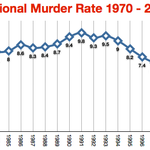

On October 29, the U.S. Justice Department released the annual FBI Uniform Crime Report for 2011, indicating that the national murder rate dropped 1.5% from 2010. This decline occurred at a time when the use of the death penalty is also decreasing nationally. The Northeast region, which uses the death penalty the least, had the lowest murder rate of the 4 geographic regions, and saw a 6.4% further decrease in its murder rate in 2011, the largest decrease of any region. By contrast, the South, which carries out more executions than any other region, had the highest murder rate. It saw a small decline from last year. The murder rate in the West remained about the same, while the rate in the Midwest increased slightly. Four of the five states with the highest murder rates are death-penalty states, while four of the five states with the lowest murder rates are states without the death penalty. See table below.
On the whole, the number of violent crimes in the U.S. dropped 3.8% from 2010 to 2011.
(T. Frieden, “U.S. violent crime down for fifth straight year,” CNN, October 29, 2012; “Crime in the United States, 2011″, U.S. Dept. of Justice, October 29, 2012; DPIC analysis). See Deterrence and Murder Rates. Listen to DPIC’s podcast on Deterrence.
| REGION | 2011 | 2010 |
| Northeast | 3.9 | 4.2 |
| West | 4.2 | 4.2 |
| Midwest | 4.5 | 4.4 |
| South | 5.5 | 5.6 |
| NATIONAL | 4.7 | 4.8 |
Rates are number of murders per 100,000 persons.



